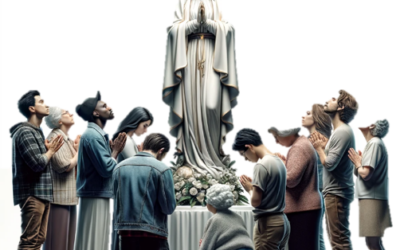Does the Roman Catholic Church function as an idol to Catholics? I believe it does. Of course, Catholics will say that it does not. They will say that the Catholic Church is the original church set up by Christ and that they are simply following what Christ has revealed in his church. But, the problem is it puts itself at such a high level of authority to which it requires submission, that asking if it serves as an idol is a valid question.
So, it is my opinion that the Roman Catholic Church functions as a type of idol to Catholics. Notice, that I said “a type of idol.” Catholics don’t bow to the Church, nor do they pray to it. But, they look to it for their truth, salvation, and comfort.
Let’s take a look at some of the teachings of the Catholic Church and see how it views itself.
- The Roman Catholic Church is necessary for salvation (CCC 846)
- The Roman Catholic Church has spiritual authority (CCC 88, 553, 2034)
- Interpreting the Bible is only possible through the Roman Catholic Church (CCC 85)
- Believing the gospel is only through the authority of the Roman Catholic Church (CCC 119)
- Salvation is found through the Roman Catholic Church alone (CCC 816)
- Catholics must go to the priest in the Roman Catholic Church for the forgiveness of sins (CCC 1495)
- Only in the Roman Catholic Church is the totality of the means of salvation (CCC 868)
- Catholics “receive the life of faith through the Church” (CCC 169)
- To obtain grace, the Catholic must follow the Catholic Church’s sacramental requirements (CCC 1129, 1598)
- To go to Jesus, the Catholic must go through Mary (Vatican Website: Encyclical of Pope Leo 13th on the Rosary, Octobri Mense, Pope Leo 13th, 1903-1914)
- The Roman Catholic must believe what the Roman Catholic Church says concerning scriptural interpretation. (Trent, Session 4, “Decree Concerning the Edition, and the Use, of the Sacred Books)
What is idolatry?
There are different definitions of idolatry. Here are three quotes. One is from a Protestant source. One is from a Catholic source. The third is from a church father (for the Catholics).
- Idolatry “(Gr. eidōlolatreia, from eidōlon, “image,” and latreia, “worship”) The worship of a false god or image of such, a practice prohibited by the law of God (Exod. 20:4–5). Figuratively, any obsessive concern that turns away worship from God can become idolatry (Eph. 5:5; Col. 3:5).”1
- Idolatry “Literally “the worship of idols,” it is giving divine honors to a creature. In the Decalogue, it is part of the first commandment of God, in which YHWH tells the people, “You shall have no gods except me. You shall not make yourself a carved image [Greek eidolon, idol], or any likeness of anything in heaven or on earth or in the waters under the earth; you shall not bow down to them or serve them” (Exodus 20:4–5).2
- “Most men regard idolatry as being limited to these practices alone: burning incense, immolating a victim, giving a sacrificial banquet, or being bound to some sacred functions or priesthoods. . . . [However, idolatry] can be practiced outside of a temple and without an idol.3
Idolatry is something that occurs in the heart. When a person gives “obsessive concern that turns away worship from God” or gives “divine honors to a creature,” then there is idolatry. But, in addition, you don’t need a physical object for it to happen. It is an attitude and a practice that stems out of that attitude.
Idolatry and the Roman Catholic Church
When we consider idolatry as an act of adoration to a created thing that really belongs to God, then we can more easily identify it. Again, in my opinion, the Roman Catholic Church exalts itself to a position dangerously close to being an idol. I say this because the Roman Catholic Church claims that it is necessary for the forgiveness of sins, that it has all spiritual authority, that it alone can interpret the Bible, that believing the gospel is through the Roman Catholic Church, and that salvation is found only in it. Such things, and more point to the exaltation of the Roman Catholic Church.
Conclusion
Now, this is subjective, and I don’t offer it as proof. But, I listen to Catholic radio quite a bit when I’m driving. I have been doing this for years. I listen and learn. And one of the things that I’ve noticed is that those who are on Catholic radio (EWTN), are always talking about salvation found in their church, the Roman Catholic Church. Coming to Christ is rarely mentioned. But coming to “The Church” is frequently mentioned. In fact, I hear more about Mary and the Catholic Church’s authority, than I do about Jesus. I hear them say that people need “to come home to the church.” It isn’t Jesus that they need to find. It’s the church. Now again, this is subjective, but over the years it has become obvious to me that the adherents of Catholicism point to their church as the source of salvation and authority, rather than Christ. Because of this, as well as what the RCC says about itself, I believe that the Roman Catholic Church functions as an idol to many Catholics.
Citations from the Catechism of the Catholic Church
Citations from the Catechism of the Catholic Church can be found at scborromeo.org/ccc.htm
- CCC 85, “The task of giving an authentic interpretation of the Word of God, whether in its written form or in the form of Tradition, has been entrusted to the living teaching office of the Church alone. Its authority in this matter is exercised in the name of Jesus Christ.”
- CCC 88, “The Church’s Magisterium exercises the authority it holds from Christ to the fullest extent when it defines dogmas, that is, when it proposes, in a form obliging the Christian people to an irrevocable adherence of faith, truths contained in divine Revelation or also when it proposes, in a definitive way, truths having a necessary connection with these…..”
- CCC 119, “It is the task of exegetes to work, according to these rules, towards a better understanding and explanation of the meaning of Sacred Scripture in order that their research may help the Church to form a firmer judgment. For, of course, all that has been said about the manner of interpreting Scripture is ultimately subject to the judgment of the Church which exercises the divinely conferred commission and ministry of watching over and interpreting the Word of God.” But I would not believe in the Gospel, had not the authority of the Catholic Church already moved me.”
- CCC 169 “Salvation comes from God alone; but because we receive the life of faith through the Church, she is our mother: “We believe the Church as the mother of our new birth, and not in the Church as if she were the author of our salvation.” Because she is our mother, she is also our teacher in the faith.
- CCC 553 Jesus entrusted a specific authority to Peter: “I will give you the keys of the kingdom of heaven, and whatever you bind on earth shall be bound in heaven, and whatever you loose on earth shall be loosed in heaven.” The “power of the keys” designates authority to govern the house of God, which is the Church. Jesus, the Good Shepherd, confirmed this mandate after his Resurrection: “Feed my sheep.” The power to “bind and loose” connotes the authority to absolve sins, to pronounce doctrinal judgments, and to make disciplinary decisions in the Church. Jesus entrusted this authority to the Church through the ministry of the apostles and in particular through the ministry of Peter, the only one to whom he specifically entrusted the keys of the kingdom.
- CCC 816, “The Second Vatican Council’s Decree on Ecumenism explains: “For it is through Christ’s Catholic Church alone, which is the universal help toward salvation, that the fullness of the means of salvation can be obtained. It was to the apostolic college alone, of which Peter is the head, that we believe that our Lord entrusted all the blessings of the New Covenant, in order to establish on earth the one Body of Christ into which all those should be fully incorporated who belong in any way to the People of God.”
- CCC 846, “How are we to understand this affirmation, often repeated by the Church Fathers? Re-formulated positively, it means that all salvation comes from Christ the Head through the Church which is his Body: Basing itself on Scripture and Tradition, the Council teaches that the Church, a pilgrim now on earth, is necessary for salvation: the one Christ is the mediator and the way of salvation; he is present to us in his body which is the Church. He himself explicitly asserted the necessity of faith and Baptism, and thereby affirmed at the same time the necessity of the Church which men enter through Baptism as through a door. Hence they could not be saved who, knowing that the Catholic Church was founded as necessary by God through Christ, would refuse either to enter it or to remain in it.”
- CCC 868, “The Church is catholic: she proclaims the fullness of the faith. She bears in herself and administers the totality of the means of salvation. She is sent out to all peoples. She speaks to all men. She encompasses all times. She is “missionary of her very nature.”
- CCC 1129 “The Church affirms that for believers the sacraments of the New Covenant are necessary for salvation. “Sacramental grace” is the grace of the Holy Spirit, given by Christ and proper to each sacrament. The Spirit heals and transforms those who receive him by conforming them to the Son of God. The fruit of the sacramental life is that the Spirit of adoption makes the faithful partakers in the divine nature by uniting them in a living union with the only Son, the Savior.”
- CCC 1495 Only priests who have received the faculty of absolving from the authority of the Church can forgive sins in the name of Christ.”
- CCC 1598 “The Church confers the sacrament of Holy Orders only on baptized men (viri), whose suitability for the exercise of the ministry has been duly recognized. Church authority alone has the responsibility and right to call someone to receive the sacrament of Holy Orders.”
- CCC 2034 The Roman Pontiff and the bishops are “authentic teachers, that is, teachers endowed with the authority of Christ, who preach the faith to the people entrusted to them, the faith to be believed and put into practice.” The ordinary and universal Magisterium of the Pope and the bishops in communion with him teach the faithful the truth to believe, the charity to practice, the beatitude to hope for.
References
| 1↑ | McKim, Donald K., The Westminster Dictionary of Theological Terms, Second Edition: Revised and Expanded. Westminster John Knox Press. Kindle Edition. |
|---|---|
| 2↑ | Hardon, John. Catholic Dictionary: An Abridged and Updated Edition of Modern Catholic Dictionary (p. 218). The Crown Publishing Group. Kindle Edition. |
| 3↑ | Tertullian (c. 200, W), 3.62. Bercot, David W., editor. Dictionary of Early Christian Beliefs (p. 350). Hendrickson Pub. Kindle Edition. |





